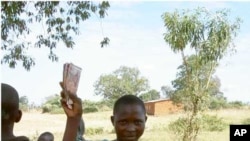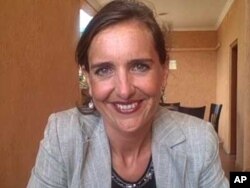A new anti-poverty program is giving Malawi’s poor an infusion of cash to help them meet their basic needs.
It’s called the Social Cash Transfer program, and it’s coordinated by a partnership between the government of Malawi and the United Nations Children Fund (UNICEF).
The program is underway in seven of Malawi’s 28 districts, including Likoma, Machinga and Mchinji.
The amount received depends on the size of the family, with a one-person household entitled to $4.20 per month. Families receive an extra $1.30 for each child in primary school and twice that for each child enrolled in secondary school.
UNICEF Chief of Social Policy in Malawi Mayke Huijbregts says poverty levels are high in Malawi, with over half the people living below the poverty line.
“The sad thing is that 22 percent of households are ultra poor, which means they live below...$10 a day [or 22 (Malawian) kwacha]. [They] really have no income to generate assets to move out of poverty,” she says.
The social welfare officer for Mchinji district, Ernest Chikuni, says among those targeted are the elderly, families headed by children and people with disabilities.
Helping determine eligibility is a local Community Social Protection Committee (CSPC), made up of community members, including local chiefs.
“What happens is that when these households have been identified, the names are sent to the district assembly, where members of the committee (CSPC) sit and scrutinize the names and finally approve the payments,” says Chikuni.
He says the households are supposed to remain in the program for two years.
“[Then],” he explains, “we are supposed to do the retargeting. [Some] households may remain in the scheme and others will graduate from [it], depending on how we have assessed their improvement.”
The project has improved the lives of those enrolled, says Chikuni.
“For instance, we have seen people building good houses with corrugated iron sheets…[and] investing in livestock [like] pigs and goats. These households are able to access medical care because they have the money and are able to travel to the nearest hospital,” Chikuni says.
One of the beneficiaries is Miriam Banda, a widow. With the $1,800 she has been receiving since 2008, she says she has managed to build a brick house.
“I am now happy that I have built my own house from saving the little I get in a month from the scheme,” says the mother of three.
Banda and others complain the financial allotments are too small and ask the project leaders to consider increasing them.
But Huijbregts says there are no immediate plans to adjust the level of transfer, although the standard of living has shot up since the launch of the program in 2006.
“At the moment, there are issues pertaining to the scheme which need to be partaken by the government. [It’s also up to the] government to pass social protection policy before these kinds of decisions can be taken because they have financial implications,” she says.
Despite the success of the program, critics say they are not happy. One of them is Austin M’ndunga, a businessman in Mchinji.
“I totally disagree with it because it encourages laziness. [Some] villagers don’t use it in a proper way; [some] are busy drinking beer with it because it’s not a large amount of money that can really make [a difference].”
M’ndunga says it would better if the program taught skills that would help people earn a living, rather than giving them money.
But Chikuni disagrees.
“We give them (the poor) the money [to] invest in one way or the other [so they can] rely on their own when they are out of the scheme.”
The program is underway in 22 African countries, including Kenya, Lesotho, Namibia, Liberia, Zimbabwe, and Sierra Leone.





